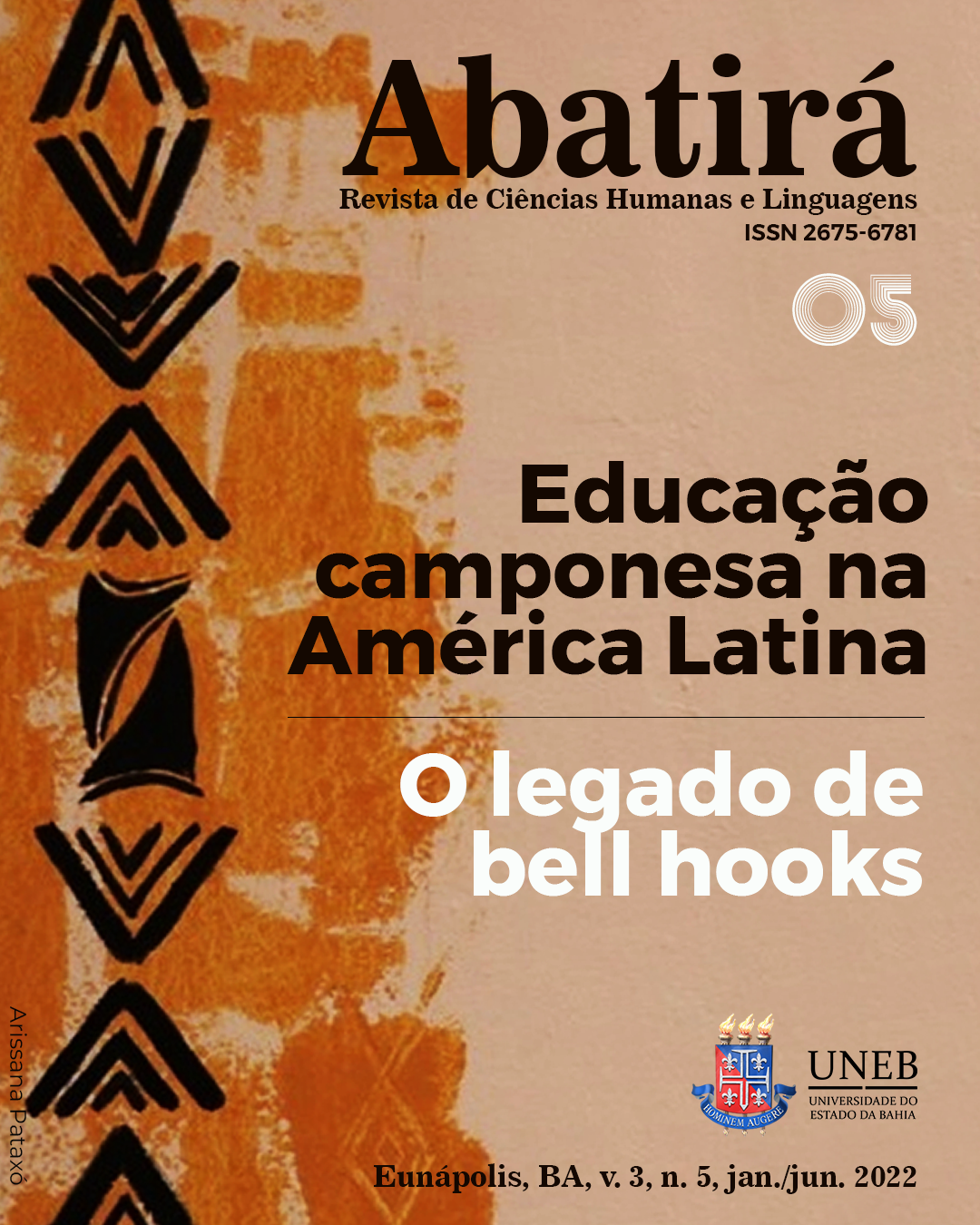Can a Black artist intellectually dialogue with her art?
Beyoncé and the ethical-aesthetic and intellectual dimensions of art
Keywords:
Beyoncé, Afrocentricity, Black IntellectualityAbstract
Resulting from the monograph “Entre colmeias & quilombos”, in this text we will discuss from and with Beyoncé about how her art and, especially, her music, promote a resumption of epistemes, cosmologies and Afro-civilizing values that were displaced from the experiences of black people from the advent of slavery so that the artistic proposition serves to rehumanize and reafricanize black people from the construction of narratives of possibilities of existence, both today and tomorrow and that is not limited to the limitations imposed by the West. We will bring here the identity we attribute to Beyoncé as a black intellectual and activist. As hooks reminds us, a Black woman who thinks, feels, creates narratives and possibilities for life, especially for her Black people. We will also address the place in which the artist and all of us who are under the aegis of the West, where we are accompanied by contradictions in our speech, positions, etc. However, these ambiguities do not diminish the goals of our actions, as well as the actions themselves; they only allow us to realize our limitations so that, who knows, we may no longer fall back into Western logics.
Downloads
References
ANI, Marimba. Yurugu: An African-centered critique of European cultural thought and behavior. Africa World Press, 1994.
ASANTE, Molefi Kete. Afrocentricidade como Crítica do Paradigma Hegemônico Ocidental: Introdução a uma Ideia. 2016.
COLLINS, Patricia Hill. O poder da autodefinição. In: COLLINS, Patricia Hill. Pensamento feminista negro: conhecimento, consciência e a política do empoderamento. São Paulo: Boitempo Editorial, 2019, p. 179-217.
ERLMANN, Veit. Communities of Style: Musical Figures of Black Diasporic Identity. In: MONSON, Ingrid (Ed.). African diaspora: A musical perspective. Routledge, 2004, p. 83-101.
FALOLA, Toyin. O poder das culturas africanas. Tradução de Beatriz Silveira Castro Filgueiras. Rio de Janeiro: Editora Vozes, 2020.
FANON, Frantz. Pele negra, máscaras brancas. Ubu, 2020.
FLOYD, Sam; ZECK, Melanie; RAMSEY, Guthrie. Afro-modernism and Music: On Science, Community, and Magic in the Black Avant-Garde. In: The Transformation of Black Music: The rhythms, the songs, and the ships of the African Diaspora. Oxford University Press, 2017.
GONZALEZ, Lélia. Por um feminismo afro-latino-americano. Rio de Janeiro: Zahar, 2020.
GOMES, Nilma Lino. O Movimento Negro educador: saberes construídos nas lutas por emancipação. Editora Vozes, 2019.
HAMPATÉ BÁ, Amadou. A tradição viva. In: KI-ZERBO, Joseph. História geral da África, I: Metodologia e pré-história da África. Brasília: UNESCO, 2010.
hooks, bell. Intelectuais negras. Estudos feministas, v. 3, n. 2, p. 464, 1995.
hooks, bell. Não sou eu uma mulher? Mulheres negras e feminismo, v. 1, 1981. Tradução livre para a Plataforma Gueto. Janeiro 2014.
hooks, bell. Tudo sobre o amor: novas perspectivas. Editora Elefante, 2021a.
hooks, bell. Ensinando comunidade. Editora Elefante, 2021b.
KABRAL, Fábio. AFROFUTURISMO: ensaio sobre narrativas, definições, mitologia e heroísmo. In: LIMA, Emanuel Fonseca et al. (Ed.). Ensaios sobre racismos: pensamentos de fronteira. Balão Editorial, 2019.
KILOMBA, Grada. Memórias da plantação: episódios de racismo cotidiano. Editora Cobogó, 2019.
LOPES, Nei; SIMAS, Luiz Antonio. Filosofias africanas: Uma introdução. Civilização Brasileira; 2ª edição, 2020.
MIGNOLO, Walter D. Histórias locais-projetos globais: colonialidade, saberes subalternos e pensamento liminar. Ed. UFMG, 2003.
MORAES, Aza Njeri (Viviane Moraes). Reflexões artístico-filosóficas sobre a humanidade negra. Ítaca, n. 36, p. 164-226, 2020.
MOREIRA, Aderbal. Natureza, morada dos orixás. In: NASCIMENTO, Elisa Larkin (Org.). Guerreiras de natureza: mulher negra, religiosidade e ambiente. São Paulo: Selo Negro, p. 153-168, 2008.
MUDIMBE, Valentin Yves. A invenção da África: gnose, filosofia e a ordem do conhecimento. Editora Vozes, 2019.
NASCIMENTO, Elisa Larkin. Sankofa: significados e intenções. In: NASCIMENTO, Elisa Larkin (Org.): A matriz africana no mundo. Selo Negro, 2008.
OYĚWÙMÍ, Oyèrónkẹ́. A invenção das mulheres: Construindo um sentido africano para os discursos ocidentais de gênero. Bazar do Tempo, 2021.
RAMOSE, Mogobe B. A ética do ubuntu. Tradução para uso didático de: RAMOSE, Mogobe B. The ethics of ubuntu. In: COETZEE, Peter H.; ROUX, Abraham P.J. (eds). The African Philosophy Reader. New York: Routledge, 2002, p. 324-330, por Éder Carvalho Wen.
RAPOSO, Paulo. “Artivismo”: articulando dissidências, criando insurgências. Cadernos de arte e antropologia, v. 4, n. 2, p. 3-12, 2015.
RIBEIRO, Ronilda Iyakȩmi. Alma africana no Brasil: os iorubás. Editora Oduduwa, 1996.
SANTOS, Tiganá Santana Neves. A tradução de sentenças em linguagem proverbial e o diálogo com o pensamento bantu-kongo a partir de Bunseki Fu-Kiau. Cadernos de Literatura em Tradução, n. 16, 2016.
SOMÉ, Sobonfu. O espírito da intimidade: ensinamentos ancestrais africanos sobre maneiras de se relacionar. São Paulo: Odysseus, 2007.
THOMPSON, Robert Farris. Black Saints Go Marching In: Yoruba Art and Culture in the Americas. In: Flash of the spirit: African & Afro-American art & philosophy. Vintage, 2010.
TRINDADE, Azoilda Loretto da. Valores civilizatórios afro-brasileiros na educação infantil. PROPOSTA PEDAGÓGICA, p. 30, 2005.
VAN SERTIMA, Ivan. They came before Columbus: The African presence in ancient America. African classicals, 1976.
WOMACK, Ytasha. Afrofuturism: The world of black sci-fi and fantasy culture. Chicago Review Press, 2013.
Downloads
Published
How to Cite
Issue
Section
License

Este trabalho está licenciado sob uma licença Creative Commons Attribution 4.0 International License.Você é livre para:
Compartilhar - copia e redistribui o material em qualquer meio ou formato; Adapte - remixe, transforme e construa a partir do material para qualquer propósito, mesmo comercialmente. Esta licença é aceitável para Obras Culturais Livres. O licenciante não pode revogar essas liberdades, desde que você siga os termos da licença.
Sob os seguintes termos:
Atribuição - você deve dar o crédito apropriado, fornecer um link para a licença e indicar se alguma alteração foi feita. Você pode fazer isso de qualquer maneira razoável, mas não de uma forma que sugira que você ou seu uso seja aprovado pelo licenciante.
Não há restrições adicionais - Você não pode aplicar termos legais ou medidas tecnológicas que restrinjam legalmente outros para fazer qualquer uso permitido pela licença.





